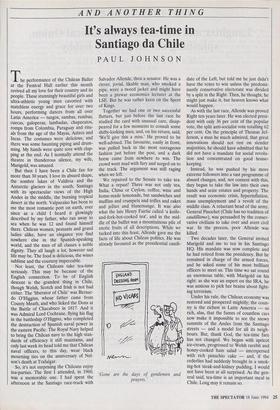AND ANOTHER THING
It's always tea-time in Santiago da Chile
PAUL JOHNSON
But then I have been a Chile fan for more than 30 years. I love its absurd shape, the sombre lakes of Valdivia and the Antarctic glaciers in the south, Santiago with its spectacular views of the High Andes in the middle, the burning tropical desert in the north. Valparaiso has been to me the most romantic port on earth, ever since as a child I heard it glowingly described by my father, who ran away to sea when he was 12 and found himself there. Chilean women, peasants and grand ladies alike, have an elegance you find nowhere else in the Spanish-speaking world, and the men of all classes a noble dignity. They all laugh a lot, however sad life may be. The food is delicious, the wines sublime and the courtesy impeccable.
Not least, the Chileans take tea-time seriously. This may be because of the English connection. To be of English descent is the grandest thing in Chile, though Welsh, Scotch and Irish is not bad either. The 'liberator of Chile' was Bernar- do O'Higgins, whose father came from County Meath, and who licked the Dons at the Battle of Chacabuco in 1817. And it was Admiral Lord Cochrane, flying his flag in the battleship O'Higgins, who completed the destruction of Spanish naval power in the eastern Pacific. The Royal Navy helped to bring the Chilean navy to the high stan- dards of efficiency it still maintains, and only last week its head told me that Chilean naval officers, to this day, wear black mourning ties on the anniversary of Nel- son's death at Trafalgar.
So, it's not surprising the Chileans enjoy tea-parties. The first I attended, in 1960, was a memorable one. I had spent the afternoon at the Santiago race-track with Salvador Allende, then a senator. He was a clever, jovial, likable man, who smoked a pipe, wore a tweed jacket and might have been a prewar economics lecturer at the LSE. But he was rather keen on the Sport of Kings.
Together we had one or two successful flutters, but just before the last race he studied the card with unusual care, disap- peared for a few moments to consult some shifty-looking men, and, on his return, said, `We'll give this a miss.' He proved to be well-advised. The favourite, easily in front, was pulled back in the most outrageous fashion just before the post, and a dark horse came from nowhere to win. The crowd went mad with fury and surged on to the track. The argument was still raging when we left.
We repaired to the Senate to take tea. What a repast! There was not only tea, India, China or Ceylon, coffee, wine and home-made lemonade, but sandwiches and muffins and crumpets and trifles and cakes and jellies and blancmange. It was also what the late Henry Fairlie called 'a knife- and-fork-hot-cooked tea', and in the mid- dle of the buffet was a mountainous pile of exotic fruits of all descriptions. While we tucked into this feast, Allende gave me the facts of life about Chilean politics. He was already favoured as the presidential candi- `Gone are the days of gentlemen and prayers.' date of the Left, but told me he just didn't have the votes to win unless the predomi- nantly conservative electorate was divided by a split in the Right. Then, he thought, he might just make it, but heaven knows what would happen.
As with the last race, Allende was proved Right ten years later. He was elected presi- dent with only 36 per cent of the popular vote, the split anti-socialist vote totalling 62 per cent. On the principle of Thomas Jef- ferson, a man he much admired, that great innovations should not rest on slender majorities, he should have admitted that he did not have a mandate for social revolu- tion and concentrated on good house- keeping.
Instead, he was pushed by his more extreme followers into a vast programme of absurd changes, and, not content with this, they began to take the law into their own hands and seize estates and property. The result was economic crisis, hyperinflation, mass unemployment and a revolt of the middle class. A reluctant head of the army, General Pinochet (Chile has no tradition of caudillismo), was persuaded by the conser- vative civilians to take over and avert civil war. In the process, poor Allende was killed.
Two decades later, the General invited Marigold and me to tea in his Santiago HQ. His mandate was now complete and he had retired from the presidency. But he remained in charge of the armed forces, and he asked some of his most brilliant officers to meet us. This time we sat round an enormous table, with Marigold on his right: as she was an expert on the IRA, he was anxious to pick her brains about fight- ing terrorism.
Under his rule, the Chilean economy was restored and prospered mightily; the coun- try is the richest in Latin America — so rich, alas, that the fumes of countless eats now make it impossible to see the snowy summits of the Andes from the Santiago streets — and a model for all its neigh- bours. But, thank God, the tea-time fare has not changed. We began with apricot ice-cream, progressed to Welsh rarebit and honey-cooked ham salad — interspersed with rich pistachio cake, — and, if the orderlies had suddenly brought in a smok- ing-hot steak-and-kidney pudding, I would not have been at all surprised. As the gen- eral said, tea-time is an important meal in Chile. Long may it remain so.


























































 Previous page
Previous page